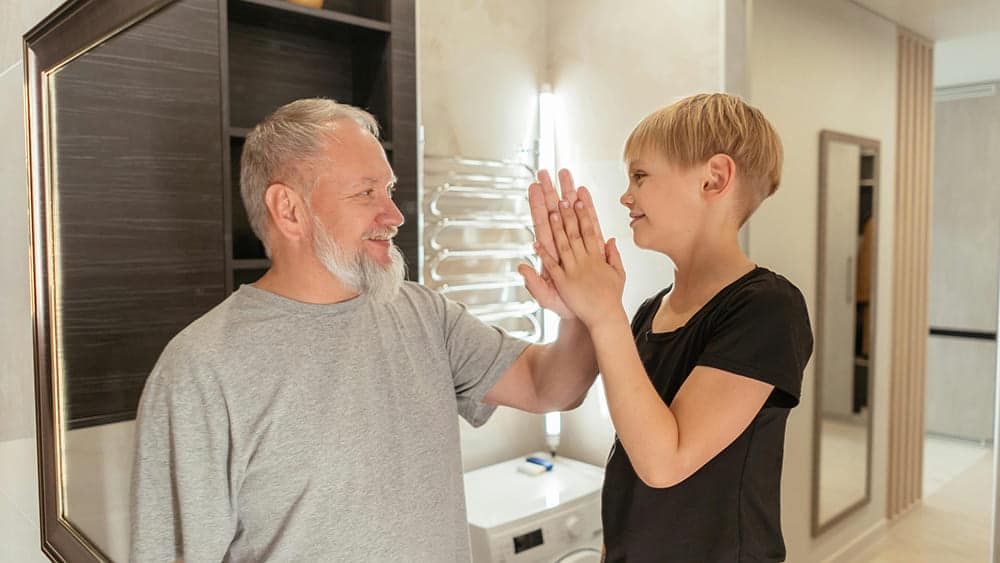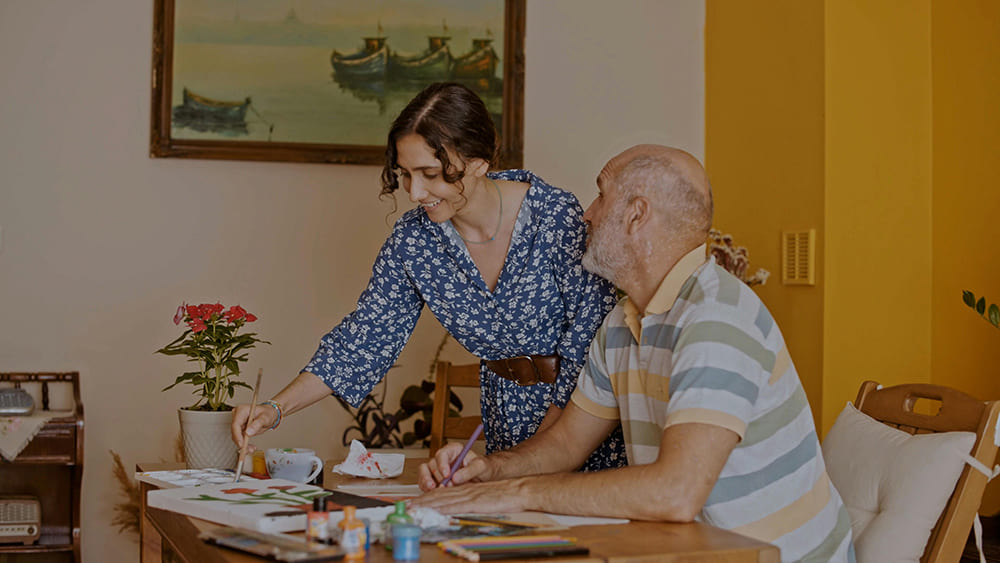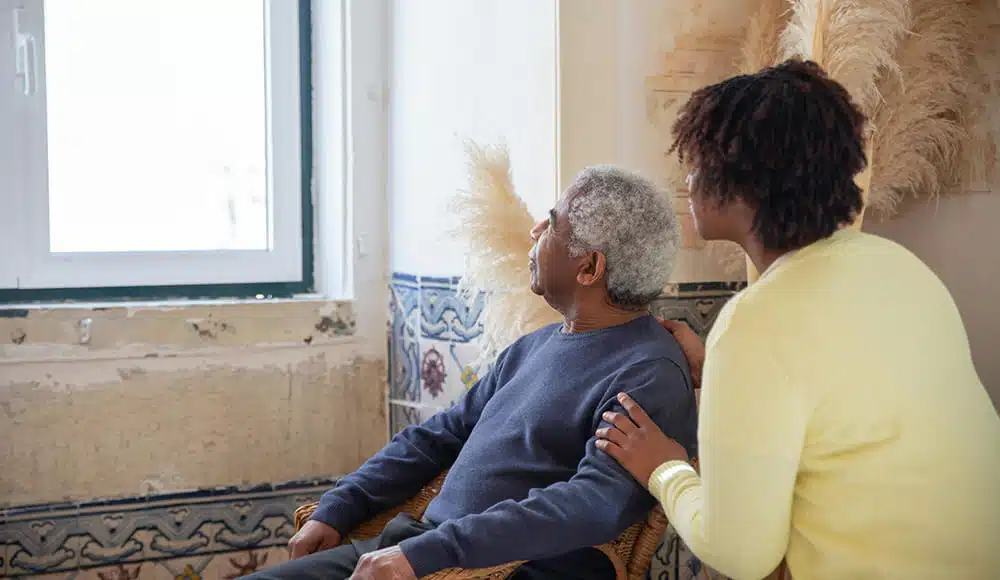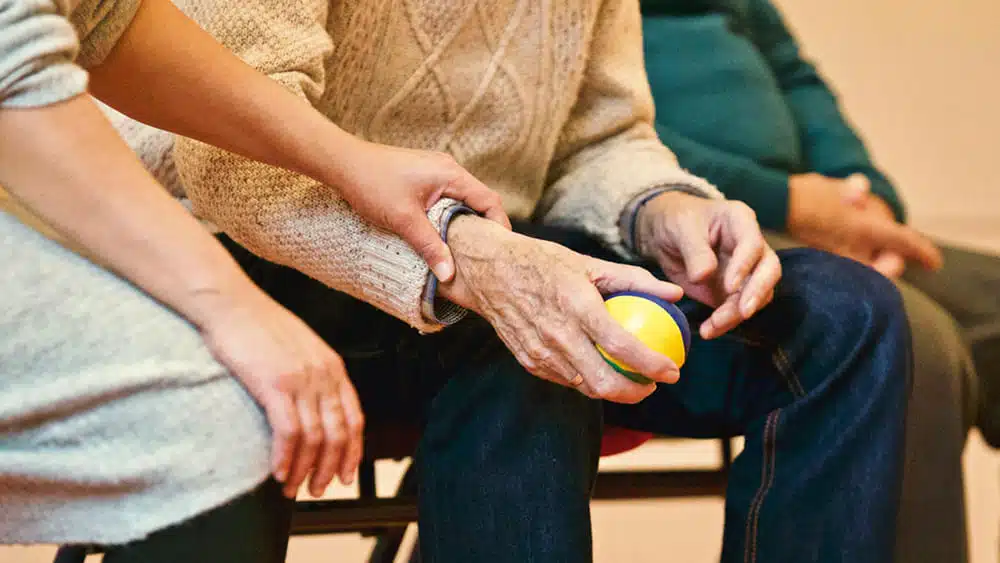Caring for someone with dementia is a challenging but rewarding journey. It requires patience, understanding, and a commitment to providing compassionate care while supporting the individual’s independence and dignity. This guide offers 10 practical tips for caregivers, covering essential aspects of daily care, communication, and creating a safe and supportive environment. With these tips, you can navigate the complexities of dementia care and provide the best possible quality of life for your loved one.

Christopher Ravn
Key Takeaways
1. Creating a safe environment, establishing routines, and providing engaging activities are essential aspects of caring for someone with dementia.
2. Effective communication involves using simple language, validating emotions, and offering reassurance to foster understanding and connection.
3. Early detection of dementia is crucial for timely intervention and utilizing various resources, including professional care and support groups, can significantly improve the quality of life for both patients and caregivers.
Table of Contents
1. How To Care For Someone With Dementia
2. 10 Tips On How To Take Care Of A Dementia Patient
3. How Do You Prepare To Give Dementia Care At Home?
4. What Are The Early-Stage Caregiving Tips For Dementia?
5. How Can Dementia Caregivers Help Themselves?
6. How Long Can A Person With Dementia Be Left Alone?
7. What Are The Signs That Dementia Is Getting Worse And Should Provide Better Care?
8. Does A Person With Dementia Know They Are Confused?
9. What Should You Not Say To A Dementia Patient?
10. How Hard Is It To Care For Someone With Dementia At Home?
11. Are Dementia Patients Better Off With Home Care?
12. How Often Should I Visit My Mother With Dementia In A Nursing Care Home?
13. Frequently Asked Questions About How To Care For Someone With Dementia
How To Care For Someone With Dementia
- Memory loss and the inability to learn new information
- Issues with communication and finding the right words to speak
- Problem-solving issues and challenges in making decisions
- Changes in mood, such as anxiety, agitation, and depression.
- Behavior and personality change
- Clear the home from any hazards, such as extension cords, clutter, and anything else that may induce a fall.
- Install grab bars and non-slip mats in the bathroom to prevent shower accidents
- Install locks and latches to prevent wandering and ensure the safety of individuals.
- Use labels and signs to help the person move closer to their home.
- Place items such as medication and phones in visible areas.
- Ensure that the outdoors is safe and free from hazards and that there are fences and gates to prevent patients from wandering around.
10 Tips On How To Take Care Of A Dementia Patient
- Ensure that they have a consistent daily routine, such as a schedule for waking up, meals, activities, and bedtime. This reduces anxiety and confusion. Use clocks, calendars, and picture schedules to help the person with dementia stay oriented
- Personal care such as bathing is helpful as they experience soothing scents, and warm water, and utilize non-slip mats for safety
- Nutrition and a balanced diet with fruits, vegetables, whole grains, and lean proteins will ensure they stay hydrated throughout the day.
- Practice patience and understanding, and use non-verbal cues such as touch, smile, and eye contact to connect.
- Ensure that the environment is safe with grab bars; use medical alert bracelets and door alarms for safety.
- Work on meaningful activities such as music therapy, memory games or puzzles, or even practice yoga to improve sleep. You may also opt to get gifts for dementia patients.
- Ensure that there is adequate rest and sleep and limit daytime naps. You can also ensure a relaxing bedtime, such as a warm bath or camping music to signal that it is time to sleep.
- Provide emotional support and remember that it is difficult for those who are struggling with the diseases
- Seek professional help, such as taking the patient for regular checkups, connecting with support groups, or even hiring a caregiver to help out with daily tasks.
- Ensure that the caregivers focus on their health, exercise regularly, and get enough sleep. They also need the love, care, and support to provide adequate care for their loved ones.
How Do You Prepare To Give Dementia Care At Home?
- Source the right information to understand the different types of dementia, their symptoms, and progression. This will help to anticipate any form of challenge and develop the ability to adapt.
- It is important to communicate effectively when caring for someone with dementia. Use clear and simple language with non-verbal cues to validate understanding and connection.
- Ensure that online resources are available and connect with support groups and local organizations that provide information and support for dementia caregivers.
To create a safe and supportive environment, you will need to ensure safety by removing hazards around the home, reducing clutter and labeling items around the house, ensuring that there are locks on doors and windows, and using visual cues such as clocks and photographs to help the person with dementia stay oriented. You will also need to find out and research how long can a person with dementia live at home.
Ensure that there is enough preparation for medical emergencies, such as having all the medications and emergency contacts in place, the contacts of family members and a first-aid kit stocked in a secure location.
How Can You Help Someone With Dementia Maintain Independence?
To help someone with dementia maintain independence, focus on what they can still do and celebrate small victories. Offer choices, such as clothes that they want to wear or foods that they feel like eating. This provides them with a sense of autonomy. Moreover, break complex tasks into small steps and provides clear instructions when necessary. Provide extra time for the patient to complete their task and do not rush them, as this leads to frustration and a lack of confidence. If it is difficult to cook meals,l then opt to prepare simple snacks.
You can even try activities that they may find interesting, such as gardening, listening to music, or looking at old photos. You may also use a multisensory approach to engage in various sensory activities, such as smelling aromatherapy oils, playing familiar music, or allowing them to touch textured objects.
- Using dressing aids like sipper pulls or velcro fasteners makes dressing easier.
- Use weighed utensils, non-slip plates, and cups that serve as aids.
- Use shower chairs or grab bars to make bathing safe and comfortable.
- Provide walkers, canes, or even wheelchairs to help with mobility and fall risk.
- Use calendars, pill organizers, and reminders to help with the daily management of medication.
- Utilize picture cards or sign language to better communicate.
What Are The Tips For Communicating With Someone With Dementia?
Tips for communicating with someone with dementia include using simple language, giving them time to process and respond to what you are saying, using facial expressions, gestures, and touch to communicate, using visual aids such as written words or pictures, and focusing on emotions.
Always be patient, as dementia patients have issues processing information. Explain and put yourself in their shoes and do not argue with them or correct them. Find ways to change the topic or redirect the conversation elsewhere.
When dealing with repeated questions and behaviors from patients, it is important to answer them to help reduce anxiety and frustration. To add on, at times patients are fixated on a particular topic or behavior, so it is advisable to gently distract them with another activity. You may want to try sensory activities for dementia patients, find out what triggers their repetition, and ensure that their feelings are validated and understood.
Join families who have found relief with EVY LIGHT®
Click below to see how EVY LIGHT® is helping others
What Are The Early-Stage Caregiving Tips For Dementia?

To identify early stages of dementia, it is important to look out for signs such as frequent forgetfulness, issues with activities such as patting the bills, finding the right words or understanding conversations, and the inability to find their way around familiar places. They will also face issues such as losing track of time, being unable to tell where they are, neglecting personal hygiene, and changes in their moods such as anxiety, depression, or irritability.
Early stages of dementia may be managed with a combination of medication, a healthy diet exercise, mental stimulation such as puzzles or reading, playing memory games and even encouraging social interaction with family and friends.
- Discuss legal aid and power of attorney. If it is a parent, then it is essential to know how to get guardianship of a parent with dementia
- Change the home settings to be safe and secure by installing grab bars, and other hazard safety equipment.
- Provide caregiver support and ensure that there is assistance and respite care.
- Consider future care options such as nursing home care or assisted living should any issues arise.
How Can Dementia Caregivers Help Themselves?
- Looking after their health by having regular exercise, eating and sleeping well,
- Participate in activities that help them relax, such as reading, or spending time in nature
- Set boundaries when it is okay to decline certain tasks or requests.
- Request for professional help if struggling with depression, anxiety or other mental health issues.
- Join a support group so that they can share their experiences with those who are going through the same ordeal.
- Attend online platforms that provide support and resources for dementia caregivers.
- Ask your loved ones for support and if possible, request help with meal preparation, errands, or simply someone to talk to.
- Seek help from a therapist to cope with stress and navigate through emotional caregiving challenges.

How Long Can A Person With Dementia Be Left Alone?
- Determine the stage of dementia the patient is in.
- Gauge their cognitive abilities such as problem-solving skills and memory.
- Consider their mobility and ability to perform.
- Whether they are experiencing any form of behavioral issues.
- Any additional medical conditions, such as heart disease or diabetes, that increase the risks of being alone.
- Reducing hazards and ensuring a secure environment.
- Making a list of emergency contacts.
- Ensure that they take their medications and have a pull-out organizer, which can be helpful.
- Prepare meals that are easy to cook and deliver.
- Provide ease of communication by ensuring that the phone is easy to reach when they want to speak to someone.
- Arrange regular check-ins, such as video calls or in-person visits.
What Are The Signs That Dementia Is Getting Worse And Should Provide Better Care?
- Increased memory loss
- Disorientation of time, place, and people.
- Unable to find the right words to communicate
- Challenges in tasks such as bathing, dressing, or using the washroom.
- Increased risk of falls, difficulty walking, or problems with balance.
- Increased agitation, restlessness, or aggression.
- increased anxiety, withdrawal, and sadness.
- Hallucinations and delusions
- Issues with sleep through the night and increased sleep during the day.
- Confused, agitated and feeling restless in the late afternoon or evening (sundowning)
- Assessing changes by utilizing cognitive tests.
- Identify underlying medical conditions via physical exams.
- Adjust or change medication as dementia progresses.
- The doctor and care team should make the necessary changes to ensure that the person’s care plan is met.
Does A Person With Dementia Know They Are Confused?
- Early stages: A person may be aware that something is wrong but is also confused by their frequent memory lapses and thus feelings of fear and anxiety.
- Middle stages: Patient may feel confusion but is not fully aware of or acknowledge it. Thus, they may deny their issues and become defensive.
- Later stages: Awareness of confusion is lost, and they may not realize that they have issues with communication, thinking, and memory loss.
- Be patient and offer reassurance and support.
- Do not argue or correct them
- Use simple language and speak clearly and slowly.
- Acknowledge their emotions, regardless of how the patient expresses their confusion.
- Redirect their attention to another topic should they feel agitated or frustrated.
- Utilize validation therapy to acknowledge the person’s feelings and experiences, whether illogical or untrue.
- Encourage the person through reminiscence therapy to talk about their experience and invoke a sense of identity.
- Engage the patient in cognitive stimulation to enhance their thinking by using puzzles, games, and reading.
- Reduce noise and strict action by providing a consistent routine with reassurance and support.
What Should You Not Say To A Dementia Patient?
You should not use phrases such as: “You are wrong”, “I told you…..”, “You are so difficult”, “Calm down”, or “You should…..”. These phrases are judgemental and come across as argumentative with someone who is suffering from dementia. Thus, it leads to agitation and feelings of being incompetent.
- Simple and not using complex sentences.
- Wait for the person to process the information that has been conveyed.
- Speak about interests or topics that they are familiar with.
- Acknowledge their emotions
- Praise and provide positive encouragement to boost their confidence.
- Pay attention to verbal and non-verbal cues.
- Joke or come up with funny stories to lighten the mood and create a positive vibe.
How Hard Is It To Care For Someone With Dementia At Home?
It is challenging to care for someone with dementia at home. This is because it requires a lot of patience, resilience, and the ability to adapt to the needs and changes of your loved one.
The challenges that are being faced are meeting the patient’s emotional needs, physical demands, being sleep deprived, social isolation, and financial strain in the long run. Thus, it is important to have a support system such as family and friends, support groups, professional counseling, and respite care to navigate the challenges of dementia caregiving.
- Alzheimer’s Association provides education, respite care, and support groups
- Local Agencies on Aging provide several services for older adults and their caregivers.
- Adult Day Care Programs provide social activities, supervision, and meals for adults with dementia and help provide breaks for caregivers.
Are Dementia Patients Better Off With Home Care?
Various factors need to be taken into consideration when considering home care or a care facility. This is dependent on factors such as resources, individual preferences, and family support. There are advantages and disadvantages to considering home care:
The benefits of home care are that the patient is familiar with and feels comfortable at home. They can also have tailored care to suit their preferences, more independence, and a close relationship with their loved ones. However, the challenges are that they have limited resources for specialized care or equipment; caregivers may be burdened physically or emotionally; they may have feelings of social isolation; and they may have a fall risk if not supervised.
As for facility care, the benefits are that the patient has round-the-clock supervision, access to specialized care, the opportunity to socialize, and a secure and safe environment. However, the challenges are that they will have issues adapting to the new environment, may have less control over their daily routine, may be expensive, and have less personalized care.
It is important to look into the person’s preferences and needs and decide on the care setting. Moreover, it is important to ensure quality of life by considering factors such as physical health, opportunities for social interaction, a safe and secure environment, and respect for their choices at the end of the day.
How Often Should I Visit My Mother With Dementia In A Nursing Care Home?
This question is based on a case-to-case basis and there is no standard answer. When visiting your mother with dementia in a nursing care home, you will need to consider availability and the visitation guidelines. This is because there is an initial adjustment period for the patients before regular visits can be scheduled.
It is important to visit them at short intervals and often to provide dementia patients with emotional support, cognitive stimulation, physical benefits such as walking, and reduced behavioral issues. It is also important that they have quality time by engaging in activities such as reading, listening to music, showing affection by hugging them, and being patient with them when they show signs of agitation or frustration.
Frequently Asked Questions About How To Care For Someone With Dementia
What Are The Tips For Communicating With Someone With Dementia?
Tips for communicating with someone with dementia include using simple language, giving them time to process and respond to what you are saying, using facial expressions, gestures, and touch to communicate, using visual aids such as written words or pictures, and focusing on emotions.
















